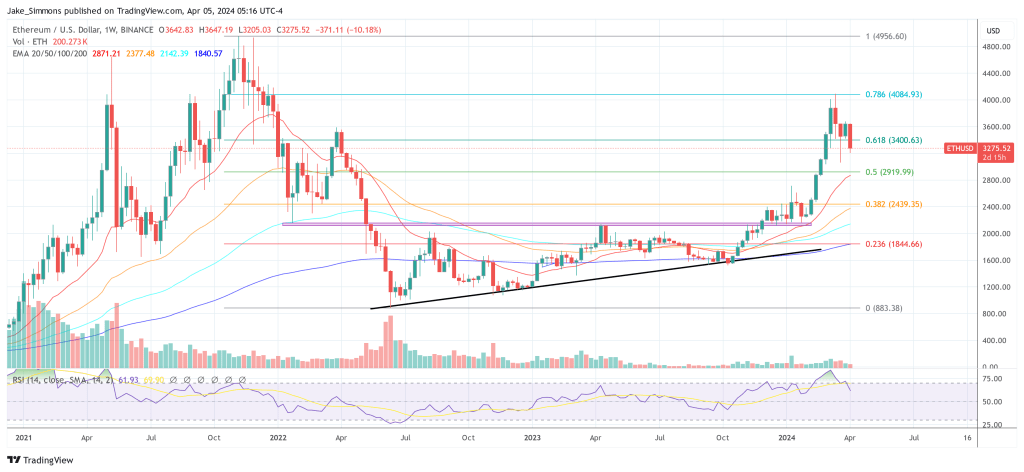In a current evaluation, JP Morgan’s International Markets Technique workforce has make clear key developments inside the Ethereum community that might considerably affect its classification underneath securities regulation. The report comes at a vital juncture for ETH, because the Swiss-based basis is under investigation by the US Securities and Change Fee (SEC).
Why Ethereum Is Not A Safety
JP Morgan highlights the continued lower in Lido’s share of staked ETH, which has fallen from about one-third a yr in the past to roughly 1 / 4 presently. This shift in direction of a extra decentralized staking ecosystem may alleviate regulatory considerations relating to centralization inside the Ethereum community.
“Optimistic for the ethereum community, the share of Lido in staked ETH has decreased farther from round one third a yr in the past to round 1 / 4 for the time being. This could cut back considerations about focus within the Ethereum community, thus elevating the prospect that Ethereum will keep away from being designated as safety sooner or later,” the report states.
The analysts additionally reference the so-called “Hinman paperwork,” launched final June, which have performed a pivotal position in shaping the SEC’s stance on digital tokens. In response to these paperwork, the diploma of community decentralization is essential, as tokens on a sufficiently decentralized community might not be categorized as securities.
It learn:
Specifically SEC officers had acknowledged up to now that tokens on a sufficiently decentralized community are not securities as a result of there isn’t a “controlling group” within the Howey take a look at.
Neighborhood Views On Decentralization
The Ethereum group has reacted positively to those developments. Anthony Sassano, founding father of The Every day Gwei and co-founder of EthHub, commented on the reducing dominance of Lido, attributing it to elevated competitors within the staking area. This, based on Sassano, is a step in direction of a extra decentralized and wholesome ETH staking ecosystem.
“I’ve been saying for a very long time that one of the simplest ways to cease Lido from rising and lowering its market share is to extend competitors within the staking area which now we have now carried out! The Ethereum staking ecosystem has by no means been more healthy,” Sassano remarked.
Nonetheless, opinions on the present crop of restaking initiatives stay blended, with some customers questioning if restaking initiatives “are higher.” In response, Sassano argued, “The talk is just in a position available as soon as now we have a vibrant free market of Ethereum staking initiatives – not a handful that dominate many of the market share.”
Seraphim, head of development at Ethena Labs, offered a realistic tackle the scenario, suggesting that providing higher yields is a more practical technique than criticism, stating: “Seems offering extra yield is healthier enterprise technique than whining like Rocketpool trolls Pleased for LRT initiatives even tho I’m Lido-biased. This accelerates the area into one thing new and thrilling.”
Extra Positives For Ethereum
JP Morgan additionally highlighted the importance of the Dencun improve of their report, which is a serious technological development because the earlier Shanghai improve. By introducing blobs and cryptographic schemes such because the KZG dedication scheme, the Dencun improve has “considerably lowered the transaction prices on Ethereum layer 2,” based on the report.
Trying forward, the anticipated Petra improve is anticipated to introduce Verkle bushes, facilitating environment friendly knowledge storage and additional bolstering Ethereum’s scalability and effectivity. The report optimistically notes, “Petra… would introduce options like Verkle bushes for environment friendly knowledge storage which purpose at simplifying block verification by pruning historic blocks older than one yr, thus conserving storage and bandwidth.”
At press time, ETH traded at $3,275.

Featured picture from Gagadget.com, chart from TradingView.com









